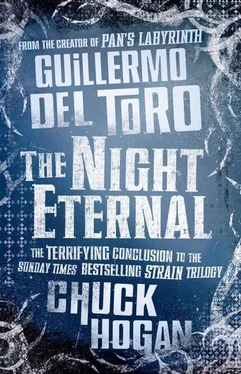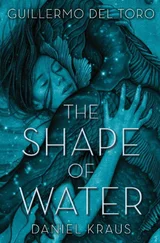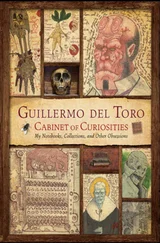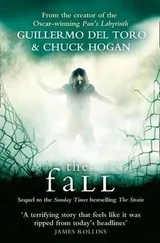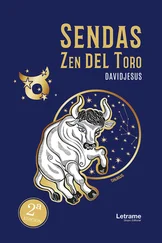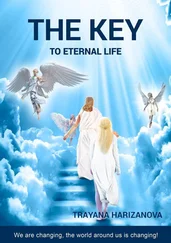Nora witnessed all these portents in the absolute silence of momentary deafness. And that, perhaps, made it sink even deeper into her psyche. She could not hear the raging rumble that her feet felt, she could not hear the crackling of the blinding light that warmed her face and her soul. A true Old Testament moment witnessed by someone dressed not in linen robes but off-the-shelf Gap. This moment rattled her senses and her faith for the rest of her life. Without even noticing it, Nora cried freely.
Gabriel and Michael joined Ozryel and together they soared into the light. The hole in the clouds brightened brilliantly as the three archangels reached it—and then with one last flare of divine illumination, the opening swallowed them up and then closed.
Nora and Fet looked around. The river was still raging, and their skiff had been swept away. Fet checked Nora, making sure she was okay.
We’re alive, he mouthed—no words audible.
Did you see that? asked Nora.
Fet shook his head, not as in, No, but as in, I don’t believe it.
The couple looked at the sky, waiting for something else to happen.
Meanwhile, all around them, large sections of sandy beach had turned to opalescent glass.
The fort residents came out, a few dozen men and women in tatters, some carrying children. Nora and Fet had warned them to take cover, and now the islanders looked to them for an explanation.
Nora had to yell in order to be heard. “Ann and William?” she said. “They had a boy with them, a thirteen-year-old boy!”
The adults shook their heads.
Nora said, “They left before us!”
One man said, “Maybe on another island?”
Nora nodded—though she didn’t believe it. She and Fet had made it to their fort island in a sailboat. Ann and William should have landed long ago.
Fet rested his hand on Nora’s shoulder. “What about Eph?”
There was no way to confirm it, but she knew he was never coming back.
THE ORIGIN BLAST obliterated the Master’s strain. Every remaining vampire vaporized at the moment of immolation. Vanished.
They confirmed this over the next few days. First by venturing back to the mainland once the waters receded. Then by checking impassioned dispatches over the liberated Internet. Rather than celebrating, people stumbled around in a post-traumatic haze. The atmosphere was still contaminated and the hours of daylight were few. Superstition remained and darkness was, if anything, feared even more than before. Reports of vampires still in existence flared up again and again, every single one eventually attributed to hysteria.
Things did not “go back to normal.” Indeed, the islanders remained in their settlements for months, working to reclaim their mainland properties but reluctant to commit to the old ways just yet. Everything everybody had thought they knew about nature and history and biology had been proved wrong, or at least incomplete. And then for two years, they had come to accept a new reality and a new regime. Old faiths had been shattered; others had been reaffirmed. But everything was open to question. Uncertainty was the new plague.
Nora counted herself among those who needed time to make sure that this way of life was going to stick. That there weren’t any other nasty surprises waiting for them just around the corner.
Fet said one day, broaching the subject gently, “What are we going to do? We have to return to New York sometime.”
“Do we?” asked Nora. “I don’t know if it’s there for me anymore.” She took his hand. “Do you?”
Fet squeezed her hand and looked out over the river. He would let her take as much time as she needed.
As it turned out, Nora and Fet never went back. They took advantage of the Federal Property Reclamation Act proposed by the interim government and moved into a farmhouse in northern Vermont, safely outside the void zone caused by the detonation of the nuclear device in the Saint Lawrence River. They never married—neither of them felt the need—but they had two children of their own, a boy named Ephraim and a girl named Mariela, after Nora’s mother. Fet posted the annotated contents of the Occido Lumen on the reinvigorated Internet and attempted to retain his anonymity. But when its veracity was eventually questioned, he embarked upon “the Setrakian Project,” curating and posting the entirety of the old professor’s writings and source materials on the Internet, free for all. Fet’s lifelong project became the tracing of the Ancients’ influence over the course of human history. He wanted to know the mistakes we had collectively made and devoted himself to avoiding their being repeated ever again.
For a time there was unrest and talk of criminal trials to identify and punish those guilty of human rights abuses under the shade of the holocaust. Guards and sympathizers were occasionally spotted and lynched, and revenge murders were widely suspected, but, in the end, more tolerant voices rose to answer to the question of who did this to us. We all did. And—little by little—with all our rancor and ghosts bearing the weight of our past, people learned to coexist once again.
In due time, others claimed to have taken down the strigoi. A biologist claimed to have released a vaccine into the water system, a few gang members exhibited assorted trophies claiming to have killed the Master, and, in the strangest twist, a large group of skeptics began to deny that the plague itself ever occurred. They attributed it all to a huge new-world-order plot, calling the entire event a manufactured coup. Disappointed, but never bitter, Fet slowly restarted his exterminating business. The rats had returned, thriving once again, another challenge to be met. He was not one to believe in perfection or happy endings: this was the world they had saved, rats and all. But to a handful of believers, Vasiliy Fet became a cult hero, and though he was uncomfortable with fame of any kind, he settled for this, and counted his blessings.
Nora, every night she put her baby boy, Ephraim, down to sleep, rubbed his hair and thought of his namesake, and his namesake’s son, and wondered what the end had been like for them. For the first few years of his life, she often speculated about what her life—with Eph—might have resembled had the strain never occurred. Sometimes she cried, and on those occasions, Fet knew better than to ask. This was a part of Nora that he did not share—that he would never share—and he gave her the room to grieve alone. But as the boy grew older and came into his own, becoming so much like his father and nothing at all like his namesake, the reality of the days washed away the possibilities of the past, and time moved on. For Nora, death was no longer one of her fears, because she had vanquished its more malignant alternative.
She carried with her always the mark on her forehead: the scar from Barnes’s gunshot. She regarded this scar as a symbol of how close she had come to a fate worse than death, though, in her later years, it became instead for her a symbol of luck. For now, as Nora gazed into the face of her baby—unmarked and full of peace—a great serenity overcame her, and out of nowhere, she remembered her mother’s words:
Looking back on one’s life, you see that love was the answer to everything.
How right she was.
The authors wish to acknowledge Dr. Seth Richardson at the University of Chicago for his assistance with Mesopotamian and biblical lore.
Also by Guillermo del Toro and Chuck Hogan
The Fall
The Strain
Also by Chuck Hogan
Devils in Exile
Читать дальше
Конец ознакомительного отрывка
Купить книгу
